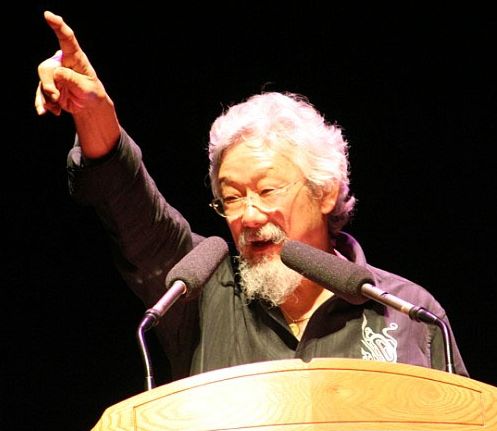Vancouverite David Suzuki and his namesake foundation surface in the U.S. news from time to time, typically through climate initiatives and ocean conservation initiatives such as its estimate of the carbon impact of the 2010 Winter Olympics.
But for our Northern neighbors, the 73-year-old Suzuki is a household name. He’s become the Canada’s preeminent environmental activist — David Roberts likened him to the Canadian Al Gore. At this weeks’ World Conference on Sport and the Environment, I asked some youngish Canucks about his first claim to fame. They weren’t sure, they said. He’s sort of always been around. (The often-helpful interwebs mention he was a genetist and longtime host of the Canadian Broadcast Corporation’s science TV series, “The Nature of Things.”)
When the Vancouver Organizing Committee released a plan yesterday to make the 2010 Winter Games carbon neutral, reporters immediately turned to Suzuki and the policy wonks at his foundation for an assessment. The foundation provided the orginal forecast of the carbon impact of the 2010 Olympics –- 300,000 tons. But it hadn’t seen VANOC’s offset purchasing plan before yesterday, so it couldn’t vouch for it.
“I would plead with VANOC to please set the bar high,” said Suzuki.
He held his own news conference to announce the release of On Thin Ice, a report on the threat climate change poses to winter sports in Canada. It found that global warming could all but wipe out ice skating, cross-country skiing, and low-elevation downhill skiing by 2050 if no action is taken.
Suzuki mentioned two “iconic Canadian images” that are already endangered by climate change – polar bears and backyard skating rinks, like the one on which a young Wayne Gretzky learned to skate.
As he’s done before, Suzuki enlisted Canadian athletes to help make his case. Professional snowboarder Justin Lamoureaux, who trains in Whistler, B.C., said he’s already found his training season and availabe space shrunk by melting glaciers.
“Imagine a Canada with no pond hockey, no snow days, no skiing,” he said. “No snowmen, snowballs or snow forts and less maple syrup. As much as some people dislike it, winter is Canada.”
Suzuki also offered a harsh critique of the Conservative-led federal government and its lack of climate action, and of the national media’s downplaying of the climate issue in last fall’s election.
“Hundreds of thousands of Canadians are already acting at the individual level, but we need leadership at the federal level,” he said.
The foundation’s report concludes with a call for national carbon regulation.
“Canada is a northern country,” Suzuki said. “We are probably as vulnerable to the effects of greenhouse gases and global warming as any country in the world.”



